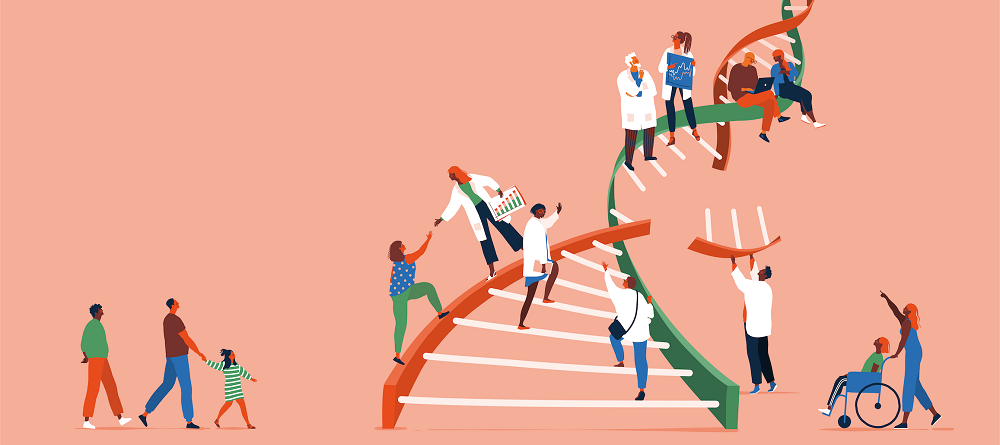18 September 2020: Led by researchers at the University of Canberra, a global coalition of experts has called for the creation of national and global “citizens’ assemblies” to weigh in on the impacts of gene editing.
Gene editing is the practice of editing the DNA of an organism, altering it in ways that can be passed on to future generations – and this both raises exciting possibilities and brings up ethical and social implications to consider.
In Global Citizen Deliberation on Genome Editing, published in the journal Science, 25 authors from around the world have called for the creation of a Global Citizens’ Assembly, made up of everyday people from all over the world, who will come together in conversation around this emerging science.
The authors span a host of disciplines, including governance, law, bioethics, and genetics, as well as practitioners on citizen and engagement and science communication.
Professor John Dryzek, head of Australia’s Centre for Deliberative Democracy and Global Governance at the University of Canberra, is the lead researcher on the project.
“These implications are so important,” he said. “They should be examined not just by those in the field, but by the general public: teachers, plumbers, butchers, bakers and candlestick-makers.”
According to the researchers, the immense potential – and potential threat – of gene editing was starkly demonstrated in 2018, when Chinese geneticist He Jiankui announced he had used the technology to create two genetically-altered babies.
Dr He was eventually jailed for three years by Chinese authorities, but his rogue work thrust crucial questions about gene-editing humans into the spotlight – how should the technology be used, and who gets to make those decisions?
It’s a technology that could enable malaria to be wiped out (by genetically altering mosquitoes), tip the balance on world hunger by boosting crop resilience, and potentially prevent conditions like sickle cell disease, cystic fibrosis and some forms of cancer.
The flip side of that – especially in pop culture – features accidental and horrific mutations, drug-resistant diseases, sterile crops, or a lab-bred race of superhumans.
With so much at stake, Professor Dryzek and his fellow researchers believe that citizens’ assemblies will prove invaluable guides for the scientists, doctors, politicians and policymakers around the world.

“The promise, perils and pitfalls of this emerging technology are so profound that the implications of how and why it is practised should not be left to experts,” Professor Dryzek said.
“A global citizens' assembly will be a major step forward as the architecture of global governance of genome editing gets constructed. It will bring to bear the considered views of citizens of the world, who will be able to think about the content of public values and principles for regulation of the technology that could receive reflective acceptance in all parts of the world.”
In the Science paper, the researchers outline their proposed numbers for a citizens’ assembly – at least 100 lay people.
“There is a big difference between what would be ideal and what is affordable – 100 would be good, 150 would be better, 200 better still,” Professor Dryzek said. “But the participants are not there to represent countries, so we don't actually need people from every country. They are there to represent the diversity of perspectives of the world's peoples.
“This is not the United Nations General Assembly, where every country gets a vote no matter how big or small. For any realistic level of funding, we are going to have to do the best we can to maximise diversity of participants. It would be nice to undertake a global random selection process, but in practice we are going to have to compromise.
“For example, we can only handle about six languages in simultaneous translation before costs start getting prohibitive. If those six were (say) English, French, Spanish, Arabic, Chinese, and Hindi, that would cover over half the population of the world, and so still enable us to do a pretty good job in capturing diversity.”
The international meeting will take place after several national versions have been conducted. Events in the United States, UK, Australia and China are already planned and fully funded by organisations including the Kettering Foundation, National Institutes of Health, the Australian Government Medical Research Future Fund Genomics Health Futures Mission, and the Wellcome Genome Campus.
Projects in Belgium, France, Germany, Brazil and South Africa are also well advanced.
“The fact that they are made up of citizens with no history of activism on an issue means they are good at reflecting upon the relative weight of different values and principles,” said Professor Dryzek.
“Think of how we trust juries in court cases to reach good judgements. Deliberation is a particularly good way to harness the wisdom of crowds, as it enables participants to piece together the different bits of information that they hold in constructive and considered fashion.”
From planning to inception to meeting, the global citizens’ assembly is being recorded by Emmy Award-winning Australian documentary-makers Genepool Productions.
“This is not about providing a speakers platform, rather a thinkers pool,” said Sonya Pemberton, Genepool creative director and co-author of the Science paper.
“The researchers have come up with a powerful and people-focussed approach to examining a world-changing technology.
“Capturing this world-first event on film, I hope, will preserve the historic occasion, amplify the global conversation, and provide a template for citizen deliberation on other, equally important matters.”
“We hope the GCA will get the attention of relevant international organisations such as the World Health Organisation and Food and Agriculture Organisation,” Professor Dryzek said. “But equally important is the contribution it will make to a more informed global conversation on genome editing, which will take effect via media coverage, social media, and the documentary series being produced in connection with the GCA.”
Click here to access the full paper, Global Citizen Deliberation on Genome Editing.
Illustration: Alice Mollon


